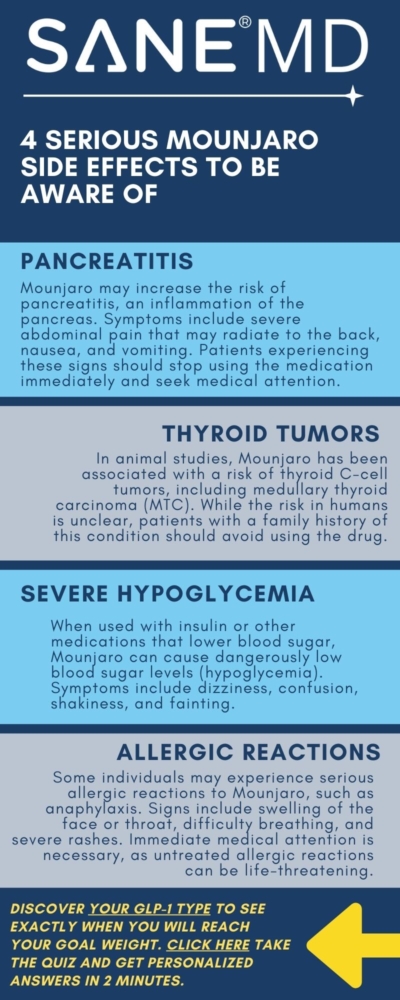17 Frequently Asked Questions About Mounjaro® for Potential Weight Loss and Blood Sugar Control
Mounjaro® is becoming a widely discussed medication for its promising weight loss and diabetes management properties. If you have questions about Mounjaro, how it works, its benefits, and what to expect, like effects, plus eligibility criteria, this FAQ will cover the most common questions to help you understand the basics and beyond.
Key Takeaways
- Mounjaro® (Tirzepatide) is an FDA-approved medication primarily for type 2 diabetes that has also shown promising weight loss benefits.
- It functions by targeting two key hormones in blood sugar control and appetite suppression, making it dual-purpose.
- Clinical trials indicate that it may promote significant weight loss, making it a potential option for certain individuals struggling with obesity.
1. What is Mounjaro®?
Mounjaro® (Tirzepatide) is a medication approved by the FDA for managing type 2 diabetes. Mounjaro® operates by activating two hormones, GLP-1 and GIP, which are essential for regulating blood sugar levels and appetite.
While its primary use is for blood sugar control, certain patients have also experienced notable weight loss, making it a promising option for those looking to manage their weight effectively.
2. Mounjaro’s Mechanism of Action
Mounjaro® functions by imitating the effects of two naturally occurring hormones in the body: glucose-dependent insulinotropic polypeptide (GIP) and glucagon-like peptide-1 (GLP-1). These hormones are crucial for regulating blood sugar levels, appetite, and digestion.
By activating the GIP and GLP-1 receptors, Mounjaro® increases insulin secretion, decreases glucagon levels, and slows gastric emptying. This multifaceted approach leads to improved blood sugar control, which may promote significant weight loss. This makes Mounjaro a potential tool for managing both diabetes and obesity.
3. How does Mounjaro® help with weight loss?
Mounjaro® aids in weight loss in compatible individuals by targeting the body’s natural hunger and fullness signals, leading to significant reductions in body weight. It influences both GLP-1 and GIP receptors, hormones that play a role in controlling appetite and digestion.
By slowing down gastric emptying and reducing hunger, Mounjaro® may help individuals feel fuller for longer periods, potentially resulting in lower food intake and weight loss over time.
4. How Does Mounjaro Help with Blood Sugar Control?
Mounjaro® helps with blood sugar control in several key ways:
- Increases insulin secretion: Mounjaro® stimulates the pancreas to release more insulin, which helps lower blood sugar levels.
- Decreases glucagon levels: By reducing the amount of glucagon in the body, Mounjaro® helps decrease glucose production in the liver.
- Slows gastric emptying: Mounjaro® slows the movement of food from the stomach to the small intestine, which helps reduce peak blood glucose levels after a meal.
- Improves insulin sensitivity: Mounjaro® enhances the body’s sensitivity to insulin, making it easier for glucose to enter the cells.
These combined effects make Mounjaro® a promising option for blood sugar control.
5. What are the common side effects of Mounjaro®?
Like most medications, Mounjaro® can cause side effects. The most commonly reported include nausea, vomiting, diarrhea, and decreased appetite. These side effects are typically mild and often diminish as your body becomes accustomed to the medication.
However, some people may experience more serious side effects, such as low blood sugar (especially if combined with insulin) or an allergic reaction, so it’s important to consult your healthcare provider if you notice anything concerning. Recognizing serious allergic reactions is crucial; if you experience symptoms such as a rash or other adverse effects, seek medical advice immediately.
The FDA has issued a boxed warning about the potential risk of thyroid cancer linked to Mounjaro®. It’s important for patients to let their healthcare provider know if they or anyone in their family has a history of thyroid cancer before beginning treatment.
6. Who is eligible to use Mounjaro®?
Mounjaro® is primarily prescribed to adults who have type 2 diabetes to enhance blood sugar control. However, because of its potential weight loss benefits, some healthcare providers may consider it for off-label use in some patients struggling with obesity.
It is not recommended for individuals with a history of pancreatitis, certain thyroid cancers, or those with type 1 diabetes. Always take the Weight Loss Drug Type Quiz and discuss with your doctor to see if Mounjaro® is right for you.
7. How long does it take to see results with Mounjaro®?
Most patients begin seeing results with Mounjaro® within a few weeks of starting treatment. For blood sugar control, improvements may occur within the first two to four weeks.
When it comes to weight loss, clinical trials have shown that potentially significant weight reduction may be seen in as little as 12 weeks for some individuals, with continued progress over the course of treatment.
However, individual results may vary depending on one’s Weight Loss Drug Type, diet, exercise, and dosage.
8. Can Mounjaro® be used for long-term treatment?
Mounjaro® is designed for long-term management of type 2 diabetes, which includes the potential for prolonged use. For weight loss, ongoing use is usually necessary to maintain results, as discontinuing the medication may lead to weight regain.
However, it’s crucial that long-term use of Mounjaro® is closely supervised by a healthcare provider to manage any potential risks or side effects that could arise over time.
9. How is Mounjaro® administered?
Mounjaro® is administered via a once-weekly injection, similar to other GLP-1 receptor agonists like Ozempic®. It comes in a pre-filled pen, which is easy to use and designed for self-administration.
Your healthcare provider will instruct you on how to use the pen properly, and you can choose the best day of the week that fits your schedule to stay consistent with your dosage.
10. What kind of diet should I follow while using Mounjaro®?
While there is no specific “Mounjaro® diet,” it is recommended to maintain a healthy, balanced diet while on the medication. Certain patients experience reduced appetite, so it’s important to focus on nutrient-dense foods to ensure your body is still getting essential vitamins and minerals.
You may also want to avoid foods that can cause gastrointestinal discomfort, such as fatty or fried foods, to minimize potential side effects like nausea.
11. Can Mounjaro® interact with other medications?
Yes, Mounjaro® can interact with certain medications, particularly those that affect blood sugar levels, such as insulin or other diabetes medications. This can increase the risk of hypoglycemia (low blood sugar). It’s important to inform your healthcare provider about all medications and supplements you are taking to avoid any harmful interactions and to adjust your treatment plan if necessary.
Additionally, if you are using birth control pills, inform your healthcare provider, as Mounjaro may affect their efficacy.
12. What are the differences between Mounjaro® and other weight loss medications?
Mounjaro® differs from other weight loss medications, such as GLP-1 receptor agonists like Wegovy® or Ozempic®, by also targeting GIP receptors. This dual-action approach can result in more effective blood sugar control and weight loss for some individuals.
While GLP-1 medications focus solely on appetite and insulin regulation, Mounjaro® offers a broader hormonal impact, potentially leading to more significant outcomes for some patients.
Additionally, Mounjaro® may be beneficial for individuals with obesity and related health issues, including high blood pressure.
13. What are the cardiovascular and kidney benefits of Mounjaro®?
Mounjaro® has shown promising cardiovascular and kidney benefits in clinical trials. These benefits include:
- Reduced risk of major adverse cardiovascular events (MACE): Mounjaro® has been shown to lower the risk of MACE, including heart attacks, strokes, and deaths from cardiovascular causes.
- Improved kidney function: For people with type 2 diabetes and chronic kidney disease, Mounjaro® has demonstrated improvements in kidney function.
- Reduced risk of diabetic retinopathy: Mounjaro® has also been shown to reduce the risk of diabetic retinopathy, a common diabetes complication that can lead to blindness.
These additional benefits make Mounjaro® a potentially comprehensive treatment option for those with type 2 diabetes.
14. Is Mounjaro® Approved for Use in Children and Teens?
Mounjaro® is not approved for use in children and teens. The safety and efficacy of Mounjaro® in pediatric patients have not been established. However, other diabetes medications, such as metformin, are approved for use in children and teens with type 2 diabetes.
If you are considering treatment options for a younger patient, it’s important to consult with a healthcare provider to find the most appropriate medication.
15. Are More Drugs Like Mounjaro® in Development?
Yes, more drugs like Mounjaro® are currently in development. Several pharmaceutical companies are working on new GLP-1 receptor agonists and GIP/GLP-1 receptor agonists, which are expected to have mechanisms of action similar to Mounjaro®.
These new drugs may offer additional treatment options for people with type 2 diabetes and obesity, potentially providing even more effective solutions for managing these conditions.
16. Is Mounjaro® covered by insurance?
Mounjaro® is typically covered by insurance for its FDA-approved use in treating type 2 diabetes. However, coverage for off-label use, such as weight loss, may vary by provider.
It’s essential to check with your insurance company to determine whether they will cover the medication for your specific condition and whether you need prior authorization.
17. What should I do if I miss a dose of Mounjaro®?
If you miss a dose of Mounjaro®, take it as soon as you remember, provided it’s within four days of your scheduled dose. If it has been more than four days, skip the missed dose and continue with your next scheduled dose.
Do not take two doses at once. Maintaining a consistent dosing schedule is important for the medication to be most effective, so try setting a reminder to stay on track.
Conclusion
Mounjaro® offers promising benefits for both diabetes management and weight loss, thanks to its unique dual-action on two key hormones. While it can be a highly effective treatment, it’s essential to know your Weight Loss Drug Type (quiz here) and consult with your healthcare provider to ensure it’s the right choice for you.
By understanding the basics of Mounjaro® and staying informed, you can make the best decision for your health and well-being.
References
https://www.uchealth.org/today/what-is-mounjaro-and-how-does-it-work-for-weight-loss/
https://www.cedars-sinai.org/newsroom/healthline-health-experts-on-using-mounjaro-for-weight-loss/
https://www.medicalnewstoday.com/articles/drugs-mounjaro-peak-time#dosage-for-weight-loss
Mounjaro® Side Effects and Safety: What to Expect Before Starting Your Weight Loss Journey
Introduction
Mounjaro® (tirzepatide) is a medication developed to assist with both weight loss and type 2 diabetes management. By targeting key hormones that regulate blood sugar and appetite, it provides a dual benefit for a subset of individuals seeking better control over their weight or diabetes. Its mechanism offers an alternative approach for individuals who have not experienced success with other treatments.
Clinical trials have provided evidence for the effectiveness and safety of Mounjaro®, offering valuable insights into its benefits and potential risks.
However, like any medication, Mounjaro® comes with potential side effects and safety considerations. Understanding these is essential before starting the treatment to ensure it aligns with your health needs and goals.
This article examines how Mounjaro® works, its potential side effects, and the precautions necessary to optimize its benefits while reducing risks and answering common questions about it.
Key Takeaways
- Mounjaro® can cause mild to severe side effects, including nausea and fatigue.
- Consulting a healthcare provider is critical before starting treatment.
- Proper monitoring and adherence to prescribed guidelines help reduce risks and enhance outcomes.
How Mounjaro® Works
Mounjaro® is a GLP-1 and GIP receptor agonist, which means it mimics two naturally occurring hormones that regulate appetite and blood sugar levels. GLP-1 slows gastric emptying and suppresses appetite, while GIP improves the body’s insulin response. Together, these actions help reduce hunger, promote satiety, and help regulate blood sugar.
By influencing these pathways, Mounjaro® can help compatible individuals eat less and maintain better blood sugar control. For those with type 2 diabetes, this regulation also helps reduce the risk of hyperglycemia. Additionally, the medication supports weight loss by helping to decrease calorie intake, making it beneficial for those struggling with obesity.
However, this mechanism can lead to certain side effects, particularly gastrointestinal symptoms. These occur as the body adjusts to changes in digestion and hormone regulation. Understanding how Mounjaro® works helps set realistic expectations and prepares users for potential side effects during the adjustment period.
Common Side Effects of Mounjaro®
Mounjaro® (tirzepatide), like many medications targeting the GLP-1 pathway, can cause a range of side effects, particularly gastrointestinal ones. These side effects are among the most commonly reported and are generally mild to moderate in intensity, often subsiding as the body adjusts to the medication over time.
Gastrointestinal Side Effects:
Nausea
This is the most frequently reported side effect of Mounjaro® and occurs as the medication slows stomach emptying (a process known as delayed gastric emptying). Many individuals find that nausea diminishes as their body adapts to the medication.
Eating smaller, more frequent meals, choosing low-fat, non-greasy foods, and avoiding overeating can help alleviate this discomfort.
Diarrhea and Constipation
These opposing symptoms are common as the digestive system adjusts to the medication. Managing these issues often involves maintaining proper hydration by drinking plenty of water, incorporating fiber-rich foods into the diet (such as fruits, vegetables, and legumes), and engaging in regular physical activity.
If these symptoms persist, over-the-counter remedies or adjustments to fiber intake may be helpful, but consultation with a healthcare provider is recommended.
Other Frequently Reported Side Effects:
Fatigue
Some individuals may feel unusually tired during the initial weeks of treatment. This may result from the body’s adaptation to changes in blood sugar regulation and appetite. Getting adequate rest and staying hydrated can help manage this side effect.
Patients should also be aware of potential interactions with other diabetes medications, which can impact blood sugar levels and increase the risk of hypoglycemia.
Reduced Appetite
A decrease in appetite is expected with Mounjaro® and is part of its therapeutic effect for weight loss. However, this can sometimes lead to inadequate nutrient intake if not monitored carefully. A balanced diet with smaller, nutrient-dense meals can prevent nutritional deficiencies.
Indigestion (Dyspepsia)
Symptoms such as bloating, heartburn, or discomfort after eating may occur but are usually temporary. Avoiding large or heavy meals and eating slowly may help alleviate these symptoms.
How to Minimize Side Effects:
Taking Mounjaro® as directed by your healthcare provider is crucial to minimizing side effects. Following any specific dietary recommendations provided, such as avoiding high-fat or fried foods, can further reduce discomfort.
Over-the-counter medications for managing nausea or indigestion should only be used after consulting a healthcare professional.
When to Contact Your Healthcare Provider:
While most side effects of Mounjaro® tend to improve with time, certain symptoms may persist or worsen, potentially requiring medical intervention.
Severe or concerning symptoms, such as persistent vomiting, severe diarrhea, or signs of dehydration (e.g., dizziness, dry mouth, or decreased urination), should prompt immediate contact with your healthcare provider. These could indicate a need to adjust the dosage or explore alternative treatment options.
By understanding the common side effects of Mounjaro® and how to address them, certain patients can better manage their experience while benefiting from the medication’s effects on blood sugar and weight management.
Less Common but Serious Side Effects, Including Severe Allergic Reaction
While most compatible individuals tolerate Mounjaro® well, there are rare but serious side effects that require prompt medical attention. Being aware of these potential risks can help you recognize warning signs early and seek timely care.
Pancreatitis (Inflammation of the pancreas)
One of the most concerning potential side effects of Mounjaro® is pancreatitis, which can develop as a rare but serious complication. Symptoms include:
- Severe abdominal pain, often radiating to the back.
- Persistent nausea or vomiting.
- Fever or chills.
If you experience any of these symptoms, it is crucial to discontinue the medication immediately and seek medical attention. Untreated pancreatitis can lead to severe complications, so early intervention is essential.
Acute kidney injury is another serious side effect. It is important to stay hydrated to prevent dehydration, which can lead to kidney injury, especially if you experience symptoms like nausea, vomiting, and diarrhea.
Gallbladder Issues (Gallstones or Cholecystitis)
Mounjaro® may increase the risk of gallbladder problems, such as gallstones or gallbladder inflammation (cholecystitis). Symptoms to watch for include:
- Intense pain in the upper-right abdomen, particularly after eating fatty meals.
- Yellowing of the skin or eyes (jaundice), indicating possible bile obstruction.
- Nausea or vomiting accompanying the abdominal pain.
While rare, acute gallbladder disease can occur, leading to serious issues like gallstones and inflammation, which necessitate medical attention.
If you notice these symptoms, consult a healthcare provider promptly, as untreated gallbladder issues may require surgical intervention.
Allergic Reactions
While Mounjaro® can be highly effective for weight loss and diabetes management, it is important to be aware of the potential for allergic reactions. These reactions can vary from mild to severe and require prompt attention.
Mild allergic reactions might include symptoms such as hives, itching, or minor swelling. However, more severe allergic reactions can pose significant health risks. If you experience any of the following symptoms, seek medical attention immediately:
- Difficulty breathing
- Swelling of the face, lips, tongue, or throat
- Dizziness or fainting
- Abdominal cramps
- Diarrhea
- Vomiting
A severe allergic reaction, known as anaphylaxis, is a medical emergency that requires immediate treatment. If you experience symptoms like difficulty breathing or throat trouble breathing, call 911 or your local emergency number without delay.
If you have a history of allergies or have previously experienced an allergic reaction to Mounjaro® or any other medication, it is crucial to talk with your doctor before starting treatment. Your healthcare provider can help assess your risk and determine the best course of action to ensure your safety.
By being vigilant about these less common but serious side effects, patients can take an active role in managing their health. Promptly reporting unusual symptoms to your healthcare provider ensures early intervention and minimizes risks.
Safety Considerations Before Starting Mounjaro®
Before starting Mounjaro®, several important factors must be carefully evaluated to ensure the medication is safe and appropriate for your specific health needs.
Who Should Avoid Mounjaro®:
Certain individuals should not take Mounjaro® due to potential health risks, including:
- Family or Personal History of Medullary Thyroid Carcinoma (MTC): Mounjaro® is contraindicated in those with a history of MTC or multiple endocrine neoplasia syndrome type 2 (MEN 2), as it may increase the risk of thyroid tumors. The FDA has issued a boxed warning about the potential risk of thyroid cancer, particularly medullary thyroid carcinoma (MTC), based on animal studies. Individuals with certain medical conditions or family histories related to thyroid cancer should discuss these risks with their doctor before starting Mounjaro.
- History of Pancreatitis: Individuals with previous episodes of pancreatitis may be at a higher risk of recurrence and should discuss alternative treatments with their healthcare provider.
Drug Interactions
Mounjaro® can interact with other medications, which may lead to adverse effects. Key considerations include:
- Insulin and Sulfonylureas: Using Mounjaro® with these medications may increase the risk of low blood sugar (hypoglycemia). Monitoring blood sugar levels closely and adjusting medication dosages is essential.
- Other diabetes medications: Other diabetes medications can also interact with Mounjaro®, increasing the risk of hypoglycemia. Patients should consult their doctors about managing these interactions.
- Other Medications: Be sure to provide a full list of your current medications to your healthcare provider to avoid potential interactions.
Blood Sugar Monitoring:
For individuals managing diabetes, regular blood sugar monitoring is critical while on Mounjaro®. The medication’s effects may necessitate dosage adjustments to prevent complications such as hypoglycemia or hyperglycemia. Routine follow-ups with your healthcare provider will help ensure optimal treatment outcomes.
Lifestyle and Dietary Considerations:
Maintaining a balanced diet and making healthy lifestyle changes may improve the effectiveness of Mounjaro® for certain individuals. Avoiding high-fat or greasy meals, staying physically active, and maintaining proper hydration are all key to maximizing benefits while minimizing side effects.
By addressing these safety considerations and remaining informed about both common and serious side effects, patients can use Mounjaro® more confidently and effectively. Collaborating closely with a healthcare provider ensures the medication is integrated into a personalized and safe health plan.
Mounjaro and Pregnancy/Breastfeeding
When it comes to pregnancy and breastfeeding, the safety of Mounjaro® has not been well-established. Limited research means that the potential risks and benefits of using this medication during these periods are not fully understood.
If you are pregnant or planning to become pregnant, it is essential to talk with your doctor about the potential implications of Mounjaro® treatment. Your healthcare provider may recommend alternative treatments that are safer during pregnancy or may choose to closely monitor your health to mitigate any risks.
Similarly, if you are breastfeeding, discussing the potential risks and benefits of Mounjaro® with your doctor is crucial. Since it is not known whether Mounjaro® passes into breast milk, your doctor might suggest alternative treatments or closely monitor both your health and your baby’s health during breastfeeding.
Open communication with your healthcare provider ensures that you receive the most appropriate and safe treatment options during these critical periods.
Long-Term Effects of Mounjaro®
Considering the long-term use of Mounjaro® involves understanding your Weight Loss Drug Type (quiz here), along with Mounjaro’s potential benefits and risks. While the medication supports weight loss and diabetes management, monitoring its long-term effects remains essential.
Regular medical check-ups are crucial for assessing the effectiveness of Mounjaro® and detecting potential side effects early. These visits help ensure the medication remains safe and appropriate for long-term use.
In addition to medical supervision, adopting healthy lifestyle changes can enhance the benefits of Mounjaro®. A balanced diet, regular physical activity, and proper hydration are key components of a comprehensive health plan that supports long-term success.
Ongoing communication with your healthcare provider is critical. By keeping your doctor informed about any new symptoms or concerns, you can work together to adjust your treatment plan as needed, ensuring the best possible outcomes for your health and well-being.
Understanding the potential long-term effects and taking a proactive approach to your health can support the safe and effective use of Mounjaro® in your journey toward improved health and weight management.
Frequently Asked Questions about Mounjaro
1. What is the most common side effect of Mounjaro®?
Nausea is the most frequently reported side effect of Mounjaro®. This occurs as the medication slows gastric emptying, which may initially upset the digestive system. Most users find that nausea subsides over time as their body adjusts. Eating smaller, balanced meals and avoiding fatty or greasy foods can help reduce nausea. If the symptom persists or becomes severe, consulting your healthcare provider is recommended to explore possible solutions.
2. How can I manage nausea while using Mounjaro®?
Managing nausea often involves dietary adjustments. Eating smaller meals throughout the day, avoiding high-fat or fried foods, and drinking plenty of water can help. Some users find that bland foods like crackers or toast ease discomfort. If nausea persists, your healthcare provider may adjust your dosage or suggest an anti-nausea medication. Patience is key, as nausea often decreases after the first few weeks of use.
3. What should I do if I experience severe side effects?
If you experience severe side effects, such as intense abdominal pain, yellowing of the skin or eyes, or difficulty breathing, stop using Mounjaro® and seek immediate medical attention. These symptoms could indicate serious conditions like pancreatitis, gallbladder issues, or an allergic reaction. While mild allergic reactions can occur, a more severe allergic reaction, known as anaphylaxis, is rare but plausible and requires immediate medical attention. Inform your healthcare provider about any severe or unusual symptoms as soon as possible to ensure proper evaluation and treatment.
4. Can Mounjaro® interact with other medications?
Yes, Mounjaro® can interact with certain medications, particularly those that lower blood sugar, such as insulin or sulfonylureas. These interactions can increase the risk of hypoglycemia. Inform your healthcare provider about all medications and supplements you are taking to avoid potential conflicts. Regular monitoring and dose adjustments can help manage these risks effectively. The Food and Drug Administration (FDA) monitors the safety of Mounjaro, including its side effects and expiration dates, and patients should consult healthcare professionals regarding these FDA-related aspects.
5. Is Mounjaro® safe for long-term use?
Mounjaro® is generally considered safe for long-term use for certain individuals under medical supervision. Regular check-ups are essential to monitor its effectiveness and identify any potential side effects. Long-term use should always be accompanied by lifestyle changes, such as a healthy diet and regular exercise, to enhance its benefits. As with any medication, ongoing communication with your healthcare provider is critical for safety and success.
Conclusion
Understanding your Weight Loss Drug Type, as well as the potential side effects and safety considerations of Mounjaro®, is an essential step in deciding whether it is the right option for your weight loss or diabetes management journey. While common side effects like nausea or fatigue are typically manageable, awareness of rare but serious risks helps ensure safe use.
Consulting a healthcare provider for personalized guidance is critical to achieving the best results. With proper monitoring and adherence to guidelines, Mounjaro® can serve as a valuable component of a comprehensive health plan, supporting long-term health and well-being goals.
Mounjaro (Tirzepatide) Side Effects: Common & Serious Perils
Mounjaro (tirzepatide) is a prescription medication primarily used to treat type 2 diabetes by helping regulate blood sugar levels. As with any medication, taking Mounjaro can result in side effects ranging from mild to severe.
Understanding Mounjaro (tirzepatide) side effects is essential for patients and healthcare professionals to ensure safe and effective use of the medication.
Key Takeaways:
- Individualized Responses to Mounjaro: Mounjaro (tirzepatide) can cause a range of side effects, from common issues like nausea and decreased appetite to serious complications such as thyroid cancer risk and acute pancreatitis. Understanding your body’s reaction and working closely with a healthcare provider is crucial for safe use.
- Importance of Monitoring and Early Intervention: Regular check-ups and proactive monitoring for symptoms, such as severe abdominal pain or signs of allergic reactions, are vital to preventing serious complications. Seeking immediate medical attention for severe side effects can reduce long-term risks.
- Lifestyle and Professional Collaboration: Managing side effects involves dietary adjustments, hydration, and collaboration with healthcare professionals to optimize treatment and minimize discomfort. Awareness of drug interactions and regular monitoring can further enhance treatment safety.
Overview of Side Effects of Mounjaro
Side effects of Mounjaro can vary significantly between individuals. While some may experience only mild discomfort, others may develop serious complications.
This article explores common and severe side effects, emphasizing the importance of monitoring and seeking immediate medical attention when necessary.
Common vs. Serious Side Effects of Mounjaro (Tirzepatide)
| Category | Common Side Effects | Serious Side Effects |
|---|---|---|
| Gastrointestinal | Nausea, vomiting, diarrhea, upset stomach | Severe nausea, acute pancreatitis, severe abdominal pain |
| Weight and Appetite | Decreased appetite, weight loss | None |
| Injection Site | Redness, pain, or swelling | Severe allergic reactions, such as anaphylaxis |
| Endocrine | None | Thyroid cancer risk, thyroid tumors |
| Gallbladder | None | Acute gallbladder disease, gallstones |
| Kidney | None | Acute kidney injury |
| Eyes | None | Worsening of diabetic retinopathy |
| Blood Sugar | Low blood sugar (hypoglycemia) | Severe low blood sugar (seizures, unconsciousness) |
| Immune System | Mild allergic reactions (rash, itching) | Severe hypersensitivity reactions |
Common Side Effects of Mounjaro
Mounjaro (tirzepatide) is generally well-tolerated, but like all medications, it may cause some side effects. Common side effects are typically mild and often diminish as the body adjusts to the treatment. While these effects can be inconvenient, they are not usually harmful.
This section highlights the most frequently reported side effects and offers insight into their potential impact on daily life.
- Nausea and Vomiting: Nausea is one of the most common side effects of Mounjaro. Clinical trials have shown that patients treated with tirzepatide frequently report this symptom, particularly when starting the medication or increasing the dosage.
- Decreased Appetite: Tirzepatide often leads to decreased appetite, contributing to weight loss in many patients. While this effect can be beneficial for some, side effects of Mounjaro can vary significantly between individuals with obesity, and it may cause concerns for individuals without weight loss goals.
- Diarrhea: Diarrhea is another commonly reported side effect. It is typically mild and resolves without intervention but can lead to dehydration if persistent.
- Injection Site Reactions: Pain, redness, or swelling at the injection site is common. These symptoms are usually temporary and subside within a few days.
- Upset Stomach and Abdominal Pain: Mounjaro may cause mild stomach pain and general discomfort in the abdomen. Adjusting dietary habits or medication timing may alleviate these issues.
Serious Mounjaro Tirzepatide Side Effects
While most patients experience only mild discomfort from Mounjaro (tirzepatide), some may encounter more severe side effects that require immediate medical attention.
These serious complications can affect various systems in the body and may signal underlying issues or reactions to the medication.
In this section, we explore the serious side effects, their warning signs, and the importance of early intervention.
- Thyroid Cancer Risk Mounjaro carries a boxed warning about an increased risk of thyroid tumors, including medullary thyroid carcinoma. Patients should monitor for symptoms like neck lumps or difficulty swallowing and discuss any family history of thyroid cancer with their healthcare provider.
- Severe Nausea and Vomiting: Severe nausea or vomiting may occur, leading to dehydration and electrolyte imbalances. These symptoms require medical evaluation.
- Acute Pancreatitis: Patients taking Mounjaro may experience acute pancreatitis, characterized by severe abdominal pain radiating to the back, nausea, and vomiting. Immediate medical attention is essential.
- Severe Stomach Pain: Severe abdominal pain may indicate more serious conditions, such as pancreatitis or gallbladder issues. This symptom should never be ignored.
- Hypersensitivity Reactions: Hypersensitivity reactions, including skin rash, trouble breathing, and severe symptoms like anaphylaxis, can occur. These are potentially life-threatening and require immediate medical attention.
- Acute Gallbladder Disease: Gallbladder problems, including gallstones and acute gallbladder disease, are potential side effects of tirzepatide. Symptoms may include severe stomach pain, nausea, and yellowing of the skin or eyes.
- Low Blood Sugar (Hypoglycemia): Low blood sugar is a common concern, especially when tirzepatide is combined with other diabetes medications. Symptoms include shakiness, sweating, and confusion. In rare cases, severe low blood sugar may occur, potentially leading to seizures or loss of consciousness. Drinking fruit juice or consuming fast-acting carbohydrates can help manage mild episodes.
- Thyroid Cancer/Tumors: The risk of developing thyroid cancer, particularly medullary thyroid carcinoma, is one of the most serious warnings associated with Mounjaro. Patients with a personal or family history of certain thyroid cancers should not use this medication.
- Gallstones and Gallbladder Disease: Gallbladder disease, including gallstones, is another potential side effect. Symptoms such as severe pain in the upper right abdomen and nausea should prompt a healthcare consultation.
- Diabetic Retinopathy: Mounjaro (tirzepatide) can potentially worsen diabetic retinopathy, a complication of diabetes that damages the blood vessels in the retina, leading to vision problems or even blindness if untreated.
- Acute Kidney Injury and Kidney Problems: Patients taking Mounjaro should be aware of the risk of kidney problems, including acute kidney injury. This can result from severe dehydration due to side effects like vomiting or diarrhea. Acute kidney injury requires immediate medical attention. Symptoms include reduced urine output, swelling, and confusion.
Allergic Reactions to Mounjaro
- Mild Allergic Reactions: Mild allergic reactions, such as skin rash or itching, are possible. These symptoms are generally manageable but should be monitored closely.
- Severe Allergic Reactions: Severe allergic reactions, including anaphylaxis, are rare but life-threatening. Patients experiencing trouble breathing or swelling should seek emergency care immediately.
- More Severe Allergic Reactions: In rare cases, hypersensitivity reactions may escalate, requiring intensive treatment. Monitoring for these reactions during initial treatment is critical.
Drug Interactions and Precautions
Other Medications
Mounjaro may interact with other diabetes medications, birth control pills, or over-the-counter drugs. Inform your healthcare provider about all medications you’re taking.
Health History and Risk Factors
Patients with a history of thyroid cancer, kidney disease, or gallbladder problems should discuss their health history with a healthcare professional before starting Mounjaro.
Monitoring During Mounjaro Treatment
Regular Check-Ups
Patients should schedule regular check-ups to monitor for potential side effects, including thyroid cancer and diabetic retinopathy.
Immediate Medical Attention
Symptoms such as severe abdominal pain, persistent vomiting, or difficulty breathing require immediate medical attention. These may indicate serious complications.
Managing Side Effects
Managing the side effects of Mounjaro (tirzepatide) involves a combination of proactive monitoring, lifestyle adjustments, and collaboration with healthcare professionals. If you’re traveling with Mounjaro, it’s important to store and transport it correctly to maintain its effectiveness. Our guide on how to transport Mounjaro on a plane provides essential tips on keeping your medication safe during air travel.
Here are effective strategies to mitigate both common and serious side effects:
Addressing Nausea and Vomiting
Patients experiencing nausea or vomiting should try consuming small, bland meals and staying hydrated. Ginger or peppermint tea may provide additional relief. If symptoms persist, a healthcare provider may recommend anti-nausea medications.
Managing Decreased Appetite
To prevent unintended weight loss, patients with decreased appetite can focus on nutrient-dense foods and schedule regular meals. Consulting a dietitian may help tailor a suitable eating plan.
Coping with Diarrhea
Rehydration is key when managing diarrhea. Drinking electrolyte solutions and avoiding high-fat or spicy foods can help minimize symptoms. Over-the-counter remedies may be used under medical guidance.
Alleviating Injection Site Reactions
For injection site pain or redness, applying a cold compress can reduce inflammation. Rotating injection sites and ensuring proper technique can also minimize discomfort.
Preventing Severe Abdominal Pain
Severe abdominal pain may signal serious conditions like pancreatitis or gallbladder disease. Patients should seek immediate medical attention if they experience persistent or intense pain.
Monitoring for Thyroid Tumors
Regular thyroid exams and awareness of symptoms like neck lumps are vital for early detection of thyroid tumors. Patients should report any unusual findings to their healthcare provider promptly.
Managing Low Blood Sugar
To prevent low blood sugar, patients should monitor glucose levels regularly and carry fast-acting carbohydrates, such as glucose tablets or fruit juice, for emergencies. Avoiding prolonged fasting and balancing meals with protein and fiber can help stabilize blood sugar levels.
Preventing Gallbladder Problems
Healthy dietary choices, such as reducing fatty food intake, may lower the risk of gallbladder problems. Recognizing early signs, like upper abdominal pain or jaundice, is critical for timely intervention.
Dealing with Allergic Reactions
For mild allergic reactions, over-the-counter antihistamines may be effective. In cases of severe allergic reactions, such as trouble breathing or swelling, emergency medical care is crucial. Patients with a history of hypersensitivity should discuss preventive strategies with their healthcare provider.
Avoiding Drug Interactions
To reduce the risk of drug interactions, patients should maintain an updated list of all medications and supplements they use. Sharing this list with their healthcare provider ensures safe prescribing practices.
Supporting Kidney Health
Staying hydrated and avoiding medications that may strain the kidneys can help prevent acute kidney injury. Patients with existing kidney conditions should have their function monitored regularly.
Collaborating with Healthcare Professionals
Frequent communication with healthcare providers is essential for managing side effects. Regular follow-ups allow for adjustments in dosage or treatment plans based on individual needs.
By adopting these strategies, patients can better manage the side effects of Mounjaro, ensuring a safer and more effective treatment experience.
Frequently Asked Questions (FAQs)
Navigating the potential side effects of Mounjaro (tirzepatide) can feel overwhelming, especially with its wide range of common and serious effects.
To help address common concerns, this FAQ section provides clear and concise answers to frequently asked questions about Mounjaro, its impact on the body, and safety considerations.
Whether you’re starting treatment or simply seeking more information, these responses aim to empower you with the knowledge needed to manage your health effectively.
1. What are the serious side effects of Mounjaro?
Serious side effects of Mounjaro include thyroid cancer risk, acute pancreatitis, severe low blood sugar, severe abdominal pain, and acute kidney injury.
These conditions can lead to life-threatening complications if not addressed promptly. Symptoms like persistent vomiting, severe nausea, unexplained abdominal pain, or difficulty breathing are warning signs that require immediate medical attention.
Early intervention can significantly reduce the risk of lasting harm or severe outcomes.
2. What are the negative side effects of tirzepatide?
Negative side effects of tirzepatide range from mild issues, such as nausea, vomiting, and diarrhea, to more severe complications, including gallbladder disease, allergic reactions, and worsening diabetic retinopathy.
While many side effects subside as the body adjusts to the medication, serious effects may require medical intervention.
It’s essential to communicate with your healthcare provider if you experience any unusual or persistent symptoms to ensure safe and effective treatment.
3. What does Mounjaro do to your body?
Mounjaro helps manage type 2 diabetes by regulating blood sugar levels and promoting weight loss. It works by mimicking the action of incretin hormones, which stimulate insulin secretion, reduce glucose production in the liver, and slow gastric emptying.
These combined effects help improve overall glycemic control and can also suppress appetite.
However, individual responses to the medication can vary, making regular monitoring crucial.
4. Who should not take tirzepatide?
Tirzepatide is not suitable for everyone. Individuals with a personal or family history of thyroid cancer, medullary thyroid carcinoma, or multiple endocrine neoplasia syndrome type 2.
It is also not recommended for pregnant or breastfeeding individuals or those with severe allergies to similar medications.
Patients should consult their healthcare provider to evaluate their medical history and determine whether tirzepatide is a safe option for their treatment.
5. What happens if you take Mounjaro and you are not diabetic?
Using Mounjaro without having diabetes may expose individuals to unnecessary risks, such as severe low blood sugar, gastrointestinal disturbances, or hormonal imbalances.
The medication is specifically designed to treat type 2 diabetes by targeting blood sugar regulation, so off-label use should only occur under strict medical supervision.
Misuse can lead to potentially harmful side effects without offering significant benefits.
6. Can you go off Mounjaro cold turkey?
Abruptly discontinuing Mounjaro is not advised, as it can cause blood sugar levels to spike or return to pre-treatment levels, potentially worsening diabetes symptoms.
A gradual tapering under the guidance of a healthcare provider allows for safer discontinuation while minimizing adverse effects.
This approach ensures a smoother transition to alternative treatments or lifestyle adjustments.
7. Does Mounjaro affect mood?
Mood changes are not commonly associated with Mounjaro, but fluctuations in blood sugar levels or the physical discomfort of side effects like nausea can influence emotional well-being.
Fatigue or irritability may also occur as the body adapts to the medication. If mood disturbances persist or become severe, it’s important to consult a healthcare provider for evaluation and support.
8. What are three common side effects?
The three most common side effects of Mounjaro are nausea, decreased appetite, and diarrhea. These effects are generally mild and tend to improve over time as the body adjusts to the treatment.
Adjusting diet and following medical advice can help manage these symptoms and ensure a more comfortable treatment experience.
9. What does tirzepatide do to your body?
Tirzepatide mimics the effects of naturally occurring hormones called incretins, which help regulate blood sugar levels and appetite. It slows digestion, reduces the release of glucose from the liver, and enhances insulin secretion when blood sugar levels are high.
These actions make it effective for managing type 2 diabetes, and in some cases, it can contribute to significant weight loss.
However, its effects on the body vary depending on individual health conditions and treatment goals.
10. Do Mounjaro side effects go away?
Many of Mounjaro’s side effects, such as nausea, vomiting, or diarrhea, tend to diminish over time as the body adjusts to the medication. Mild side effects are often temporary and can be managed with dietary changes or medication timing adjustments.
However, more serious side effects may persist and require medical intervention. Regular follow-ups with a healthcare provider are crucial to ensure any lingering or severe symptoms are addressed.
11. How to stop feeling sick on Mounjaro?
If you feel sick while taking Mounjaro, small dietary changes like eating bland, low-fat meals and avoiding heavy or spicy foods can help alleviate nausea.
Staying hydrated and consuming ginger or peppermint tea may provide additional relief. If the sickness persists, your healthcare provider may adjust your dosage or recommend medications to manage the symptoms.
Always consult a healthcare professional before making changes to your treatment plan.
12. How long does it take for the effects of Mounjaro to wear off?
The effects of Mounjaro can last for several days to weeks, depending on factors like dosage and individual metabolism.
As a long-acting medication, its active components remain in the body even after a dose is missed or stopped, gradually decreasing over time.
If discontinuing treatment, consult your healthcare provider to manage any potential changes in blood sugar levels or other health concerns during the transition.
Conclusion
While Mounjaro (tirzepatide) is a promising treatment for type 2 diabetes, it carries risks that must be carefully managed. Understanding common and serious side effects, such as nausea, thyroid cancer risk, and acute kidney injury, helps patients make informed decisions about their treatment.
Always consult a healthcare professional before starting or stopping any medication.




















